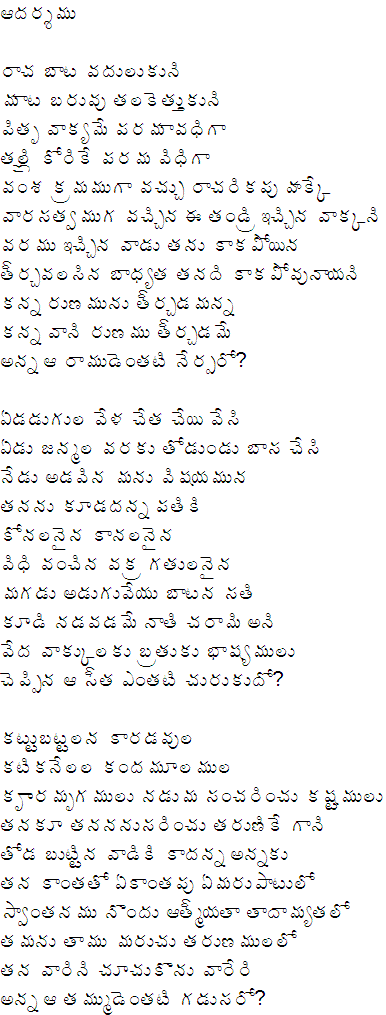|
Poem
on Srirama navami by Srinivas Kanchibhotla
At this defining moment of Rama renouncing his right to rule, to honor his father's word, and instead take to the woods, is where Ramayana rises from just an interesting narrative to a great tale of nobility. In this situation whatever Rama, Seeta and Lakshamana did were certainly not required of them at all. Rama didn't have to renounce his right to the throne at all, after all it wasn't him who gave the boon to Kaika. Legally or even morally, he cannot be held responsible for his Kaika's wishes. But what Rama chose to do was really noble. The phrase that is usually used here is "pitru vaakya paripaalana" (adherence to his father's word), but what is interesting is, Rama didn't adhere to what Dasaradha instructed him to do, instead Rama adhered to what Dasaradha was obligated to. So the phrase needs to be understood as "tanDri icchina maaTa yokka paripaalana" (honoring his father's obligation), than merely "tanDri maaTa aacharaNa".
Next comes Seeta. Again, absolutely no need to accompany her husband. The world didn't find fault with Urmila for not joining her husband. The first duty of the husband is to ensure wife's safety and guarantee her security at all costs. In that context, when Rama asks Seeta to stay back, he is well within his rights in asking her so. But Seeta invokes the phrase "naati charaaami" spoken during the wedding ritual. It means, as spoken by both the husband the wife, that through all the 4 purushaardhas, they will not leave the side of each other. Though husband's word has a higher precedence, more so when ensuring the safety of his wife, Seeta trades her security to the companionship.
While it is understandable that the husband and the wife wish to remain together through the thick and the thin, what Lakshmana does is even more noble. Here, Lakshama neither had any direct connection to the wishes, nor was he bound by any other ties that requires him to follow his brother. It wasn't duty, it wasn't responsibility and it certainly wasn't out of sympathy. Overlooking his own well-being, letting go of his interests, and above all, sacrificing his own marital bliss, Lakshamana tops the list of noble acts, certainly above Rama and Seeta. This is why Ramayana is said to deal with idealism (AdarSam) - carrying on beyond the call of duty.

By
Srinivas Kanchibhotla
Tell
Srinivas Kanchibhotla how you liked this poem
Srinivas
Kanchibhotla poem on Ugadi 2008
Srinivas
Kanchibhotla poem on Maha Sivarathri 2008
Srinivas
Kanchibhotla poem on Sankranthi 2008
Srinivas
Kanchibhotla poem on Deepavali 2007
Srinivas
Kanchibhotla poem on Vinayak Chavithi 2007
Srinivas
Kanchibhotla poem on Ugadi 2007
Srinivas
Kanchibhotla poem on Sankranthi 2007
Srinivas
Kanchibhotla poem on Deepavali 2006
Srinivas
Kanchibhotla poem on Vinayaka Chaviti 2006
Srinivas
Kanchibhotla poem on Sriramana Navami 2006
Srinivas
Kanchibhotla poem on Ugadi 2006
Srinivas
Kanchibhotla poem on Maha Sivarathri 2006
Srinivas
Kanchibhotla poem on Sankranthi 2006
Ravi's poem on Dhoni
Srinivas
Kanchibhotla poem on Deepavali 2005
Srinivas Kanchibhotla poem on
Vijaya Dasami 2005
Srinivas Kanchibhotla poem on Vinayaka
Chaviti 2005
Srinivas Kanchibhotla poem
on Sriramanavami
Srinivas Kanchibhotla poem on Ugadi
Srinivas Kanchibhotla poem on
Sivarathri
Srinivas Kanchibhotla poem on
Sankranthi
Srinivas Kanchibhotla poem on
Dipavali
Srinivas Kanchibhotla poem on Dasara
Also read Bhanu's poem on
Shankar Dada MBBS
Also read Bhanu's poem on
Sirivennela
Also read Bhanu's poem on
Malliswari
|
|

